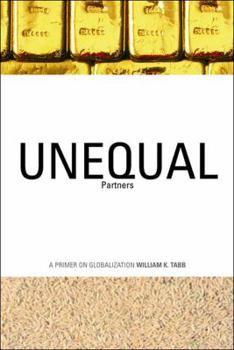Unequal Partners: A Primer on Globalization
We know that globalization has sent labor from industrialized countries to the Third World, where workers are paid far less. But do we know the effect of the global market on education, the spread of... This description may be from another edition of this product.
Format:Paperback
Language:English
ISBN:1565847229
ISBN13:9781565847224
Release Date:May 2002
Publisher:The New Press
Length:273 Pages
Weight:0.80 lbs.
Dimensions:8.3" x 0.8" x 5.8"
Customer Reviews
2 ratings
A great job at summing up the core problems of globalization
Published by Thriftbooks.com User , 22 years ago
Professor Tabb has done an excellent job here. This book is well researched, well argued and cautious to avoid naive oversimplifications of the issues surrounding globalization. I haven't read another book that lays out more clearly the ways in which "globalization" is effecting the environment, workers rights and democratic ideals. I strongly encourage you to read this book if you are looking for solid information on what the "globalization" debate is all about. There is certainly too much to overview in this space. However, I should respond to another reviewer's claim that Professor Tabb is not well researched in that he does not cite much from academic journals. this is true, as the scope and focus of this book lies outside of academic ideological posturing on world issues and goes to the statistical facts, actual statements and track records of global finance institutions and examines the official public line on these issues, as documented in the Economist and the Wall Street Journal. this book is in fact very well researched, and very much worth your time.
Refutes the logic of neoliberal capitalism
Published by Thriftbooks.com User , 23 years ago
The author gives some examples of the logic of capitalism. For instance, he quotes the memo written by former Clinton treasury secretary and current Harvard president, Larry Summers, when he was Chief economist at the World Bank in 1991. In that memo he explained the "impeccable" economic logic of exporting "health-impairing pollution" to "vastly underpolluted countries" such as in Africa. And then there is recounting of former Bush treasury secreatary Paul O'neil's confrontation at a shareholders meeting with one of the workers at an Alcoa plastics plant in Mexico when he was CEO of that company. O'neil told him that Alcoa's plants were so clean in Mexico that one could eat off their floors but the worker responded that his excellency was lying and produced newspaper clippings to prove it. Alcoa pays virtually no taxes in the town of the Mexican plant of that worker and the town's infrastructure (schools, hospitals, sewage, etc) is in shambles. Half of the town's 15,000 residents use backyard latrines. Alcoa, along with Ford, contributed 52,000 dollars to build a school for three hundred students, that has one teacher, a leaky roof......He points to the workers at the Reebok plant in Thailand, workers in China's "industrial zones," Nike and Alcoa workers in Mexico. Instead of working 80 hours a week, and getting constantly cut and bruised by machines, and getting chemicals in the eyes and nausea and headaches, or getting beaten up if you don't work fast enough and getting arrested if you try to leave work, these people could fight for their dignity if they had a viable union to advance their cause. It is only labor rights, such as the right not to be fired for launching a strike, which allow workers to try to get rights to decent pay, humane working conditions and other such essentials while they make their bosses such huge profits with their work. The author goes over some of the public relations efforts of such companies. The Clinton administration helped in such an effort with top retail companies which created a "code of conduct" with companies policing themselves but such standards have been little enforced. The author looks at the particularly interesting case of aids drugs. 17 million people and counting have died of AIDs in Africa. However U.S. companies have patents on the leading AIDs drugs which gives them a monopoly on producing them so they can charge 10,000 dollars to poor Africans for Aids treatment. Al Gore on behalf of U.S. pharmaceuticals threatened sanctions on South Africa when that country passed laws allowing for local companies to produce Aids drugs at 90 to 95 percent cheaper than American pharmaceutical companies demand. The Clinton administration argued that compulsory liscencing laws did not apply in that case. And the Pharmaceuticals have argued that they need to charge high prices so they can continue to research Aids treatments and if they are stricted their entrepreneurial genius will strangled. Of course, the prob





